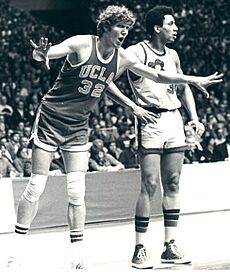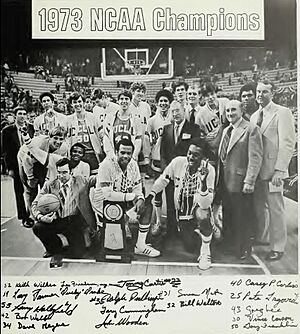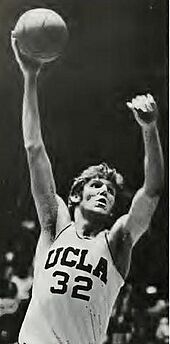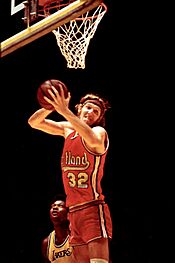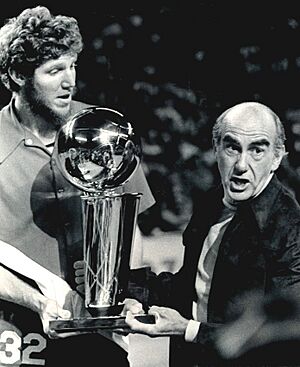Bill Walton facts for kids
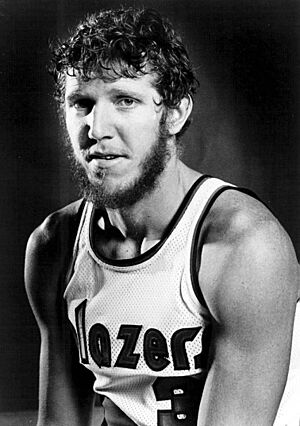
Walton with the Portland Trail Blazers in 1977
|
|
| Personal information | |
|---|---|
| Born | November 5, 1952 La Mesa, California, U.S. |
| Died | May 27, 2024 (aged 71) San Diego, California, U.S. |
| High school | Helix (La Mesa, California) |
| Listed height | 6 ft 11 in (2.11 m) |
| Listed weight | 210 lb (95 kg) |
| Career information | |
| College | UCLA (1971–1974) |
| NBA Draft | 1974 / Round: 1 / Pick: 1st overall |
| Selected by the Portland Trail Blazers | |
| Pro career | 1974–1988 |
| Career history | |
| 1974–1979 | Portland Trail Blazers |
| 1979–1985 | San Diego / Los Angeles Clippers |
| 1985–1988 | Boston Celtics |
| Career highlights and awards | |
|
|
| Career NBA statistics | |
| Points | 6,215 (13.3 ppg) |
| Rebounds | 4,923 (10.5 rpg) |
| Assists | 1,590 (3.4 apg) |
William Theodore Walton III (born November 5, 1952 – died May 27, 2024) was an American professional basketball player. He also became a television sportscaster. He played college basketball at University of California, Los Angeles (UCLA). In the National Basketball Association (NBA), he played for the Portland Trail Blazers, San Diego / Los Angeles Clippers, and Boston Celtics.
Walton was a member of the Naismith Memorial Basketball Hall of Fame. He also joined the National Collegiate Basketball Hall of Fame. He played for coach John Wooden at UCLA. There, he won three national college player of the year awards (1972–1974). He led UCLA to NCAA championships in 1972 and 1973. His team also had an amazing 88-game winning streak.
After being the first player picked in the 1974 NBA draft, Walton led the Portland Trail Blazers to an NBA championship in 1977. He was named the NBA Finals Most Valuable Player Award. The next season, Walton was the NBA Most Valuable Player (MVP) in 1978.
However, Walton's professional career was often stopped by many foot injuries. He had to have many surgeries. He missed the 1978–79 season. He then signed with the Clippers, playing four seasons that were also affected by injuries. His career got better when he joined the Celtics. Playing as a backup, Walton won the NBA Sixth Man of the Year Award in the 1985–86 season. He also won his second NBA championship. He was named to the NBA's 50th and 75th anniversary teams. Walton was put into the Naismith Memorial Basketball Hall of Fame in 1993. He joined the National Collegiate Basketball Hall of Fame in 2006.
After retiring from the NBA, Walton learned to overcome stuttering. He started a new career as a sportscaster. He worked as an analyst and commentator for several TV networks. He won an Emmy Award in 1991. Walton was a big fan of the Grateful Dead band. He often talked about them during his broadcasts. He hosted podcasts and radio shows about their music.
Contents
Early Life and Family
Bill Walton was born and grew up in La Mesa, California. His parents were Gloria Anne and William Theodore "Ted" Walton, Jr. He had three siblings: Bruce, Cathy, and Andy. Their home was on a hillside near Lake Murray.
Bill's father, Ted, was a music teacher and social worker. His mother, Gloria, was a librarian. His parents loved art, books, politics, and music. Bill took music lessons. Even though his parents weren't very interested in sports, Bill followed his older brother Bruce, who liked sports. When the Walton kids were in junior high and high school, their dad started a family band. Bruce played trombone, Bill played baritone horn, Andy played saxophone, and Cathy played drums.
Walton first played organized basketball at his Catholic elementary school. His coach, Frank "Rocky" Graciano, made basketball fun for him. Walton said that Coach Graciano "really emphasized the joy of playing the team game." Walton was shy and had trouble speaking. He found a safe place in basketball.
High School Basketball
Walton played high school basketball at Helix High School in La Mesa. His older brother Bruce, who was a year ahead of him, also played. Bruce was also a great football player. If other players tried to be too rough with Bill in a basketball game, Bruce would protect him.
Walton remembered, "When those opposing teams would try to get physical with me, Bruce would do whatever it took to protect me." Bruce later played for the Dallas Cowboys. Bill and Bruce are the only brothers in history to play in both the Super Bowl and win an NBA championship.
Walton's problems with injuries started in high school. He broke an ankle, a leg, and several bones in his feet. He also had knee surgery. Before his second year, he had surgery on his left knee. Because of this, he played most of that year on the junior varsity team. He only played in six varsity games at the end of the season.
Between his second and third years of high school (around age 15–16), Walton grew a lot. He went from 6 feet 1 inch to 6 feet 7 inches tall. His coach played Bill and Bruce together. Bill was taller but still thin. He couldn't play a whole game without resting because he would get too tired.
When Walton was in high school in 1967, the NBA team San Diego Rockets came to town. They often played pickup games at Helix High School. The Rockets players learned they could call teenage Walton, who had a key to the gym. Walton remembered players like Elvin Hayes calling him to open the gym. He became friends with many of the Rockets players.
High School Championships
Walton overcame his injuries and led Helix to 49 wins in a row in his last two years. Helix won the California Interscholastic Federation (CIF) Championship in 1969 and 1970. They finished 29–2 in 1968–69 and an amazing 33–0 in 1969–70. He was about 6 feet 11 inches tall when he graduated. In his senior year, Walton averaged 29 points and 25 rebounds.
As a senior in 1969–70, Walton made 384 out of 490 shots, which is 78.3 percent. This is still a national record. His 825 rebounds that season rank third all-time. His 25.0 rebounds per game in a season ranks seventh all-time.
In 1970, Sports Illustrated magazine featured Walton in "Faces in the Crowd." This was his first national recognition.
Hall of Fame Coach Denny Crum, who was an assistant at UCLA, went to watch Walton play. Crum first saw Walton in 1968 and was very impressed. He told Coach Wooden that Walton was the best high school player he had ever seen.
College Career at UCLA
From a young age, Walton was a loyal fan of UCLA's basketball team. Many colleges wanted him, but he quickly accepted UCLA's offer. He wanted to play for the Bruins and Coach Wooden. Coach Wooden became a lifelong mentor to Walton.
Walton played for UCLA under Coach Wooden from 1971 to 1974. His older brother Bruce also played football at UCLA. Bill Walton led the Bruins to two perfect 30–0 seasons. They also set an NCAA men's basketball record with an 88-game winning streak. This streak was part of Walton's personal 142-game winning streak. This streak lasted almost five years, including his high school and UCLA freshman teams.
Freshman Year (1970–1971)
Before joining the main team, Walton was part of the 20–0 UCLA freshman team in 1970–71. He averaged 18.1 points per game. The main UCLA team won the 1971 NCAA Championship.
When Walton first arrived at UCLA, he didn't want to cut his long hair. Coach Wooden told him, "we'll miss you." Walton then rode his bike to a barber nearby.
Sophomore Year (1971–1972)
The 1971–72 UCLA basketball team had a perfect 30–0 record. They won their games by more than 30 points on average. Walton played with teammates like Henry Bibby and Keith Wilkes. UCLA finished 14–0 in their conference.
In the 1972 NCAA tournament, UCLA won against Weber State and Long Beach State. They reached the Final Four. In the semifinal, Walton scored 33 points and grabbed 21 rebounds against Louisville. UCLA won 96–77. In the NCAA championship game, he had 24 points and 20 rebounds. The Bruins won 81–76 against Florida State. Walton was named the tournament's Most Outstanding Player.
For the 1971–72 season, Walton averaged 21.1 points and 15.5 rebounds. He shot 64.0% from the field. He was named first-team All-American.
Junior Year (1972–1973)
UCLA had another perfect season in 1972–73, finishing 30–0. They won games by over 20 points on average.
In the 1973 NCAA tournament, UCLA beat Arizona State and San Francisco. They reached the Final Four again. In the semifinal, the Bruins won 70–59 over Indiana. Walton had 14 points, seven rebounds, and nine assists.
In the 1973 NCAA title game against Memphis State, Walton had one of the best individual performances ever in a championship game. He scored 44 points, making 21 out of 22 shots. He also had 13 rebounds. He led the Bruins to their seventh straight title, winning 87–66. Walton set the record for most points in an NCAA championship game, which still stands. He was again named the tournament's most outstanding player.
Walton's political views were known during his college years. He was active in campus protests. He was once arrested during an anti-Vietnam War protest. Coach Wooden had to help him.
Senior Year (1973–1974)
In Walton's senior year, UCLA's 88-game winning streak ended. They lost 71–70 to Notre Dame on January 19, 1974. Walton played with a back brace because of an injury. UCLA had a big lead but lost the game. Walton called it a "complete failure."
Later, UCLA lost two games in a row. UCLA finished the season 26–4.
In the 1974 NCAA tournament, UCLA beat Dayton and San Francisco. They reached the Final Four. However, their streak of national titles ended. North Carolina State beat the Bruins 80–77 in double overtime in the semifinals. Walton played 50 minutes and scored 29 points. He called this loss the most disappointing moment of his basketball career.
As a senior, Walton averaged 19.3 points, 14.7 rebounds, and 5.5 assists. He was named 1st Team All-American.
College Achievements
In his 87 games at UCLA, Walton shot 65.1% from the field. He averaged 20.3 points, 15.7 rebounds, and 5.5 assists. UCLA won 86 games and lost only 4 during Walton's three seasons.
Walton won the James E. Sullivan Award in 1973 as the top amateur athlete in the United States. He also won the USBWA College Player of the Year and Naismith College Player of the Year awards in 1972, 1973, and 1974. He earned Academic All-American honors. Some basketball historians say Walton was the greatest college player ever.
Walton remained lifelong friends with Coach Wooden. Walton said, "Coach Wooden never talked about winning and losing, but rather about the effort to win. He rarely talked about basketball, but generally about life."
Professional Career
Portland Trail Blazers (1974–1979)
Early Years and Injuries (1974–1976)
The American Basketball Association's Dallas Chaparrals tried to draft Walton in 1973. The San Diego Conquistadors also tried to sign him in 1974. But Walton was not interested.
Walton was the first player picked overall by the NBA's Portland Trail Blazers in the 1974 NBA draft. He signed with them.
Walton's first two seasons in Portland were tough because of many foot injuries. He sprained an ankle, broke his left wrist twice, dislocated two toes, and injured his leg.
As a rookie in 1974–75, Walton averaged 12.8 points, 12.6 rebounds, and 2.7 blocks in 35 games. The Trail Blazers finished 38–44.
In 1975–76, Walton averaged 16.1 points and 13.4 rebounds in 51 games. Portland finished 37–45.
First Championship (1976–1977)
In the 1976–77 NBA season, Walton played in 65 games. With new coach Jack Ramsay and new teammate Maurice Lucas, the Trail Blazers became a surprise team.
Walton led the NBA in rebounds per game (14.4) and blocked shots per game (3.2). He was chosen for the NBA All-Star Game, but couldn't play due to injury. He was named to the NBA All-Defensive First Team and the All-NBA Second Team. He averaged 18.6 points, 14.4 rebounds, and 3.2 blocks. Portland finished 49–33.
In the 1977 playoffs, Portland won against the Chicago Bulls and Denver Nuggets. In the Western Conference finals, they swept the Los Angeles Lakers. Walton played against his former UCLA teammate Kareem Abdul-Jabbar.
Portland then played the favored Philadelphia 76ers in the 1977 NBA Finals. After losing the first two games, the Blazers won four games in a row to win the NBA championship. Walton scored 20 points and grabbed 23 rebounds in the final game. He was named the Finals MVP.
MVP Season and Holdout (1977–1979)
The next season, the 1977–78 Trail Blazers won 50 of their first 60 games. Walton averaged 18.9 points, 13.2 rebounds, and 2.5 blocks in 58 games. Then, he broke his foot, ending his regular season. Walton still won the 1978 NBA Most Valuable Player award. He played in his only NBA All-Star Game in 1978. He was also named to the NBA's First All-Defensive Team and the All-NBA First Team.
Portland finished the regular season 58–24. Walton returned for the 1978 NBA playoffs. But he got injured again in the second game of the series against the Seattle SuperSonics. X-rays showed a broken bone in his left ankle. Portland lost the series. Walton never played for the Trail Blazers again.
During the off-season, Walton asked to be traded. He said the Blazers' team doctors did not treat his injuries well. He sat out the entire 1979 season in protest. Walton eventually signed with the San Diego Clippers in 1979.
In five seasons with Portland, Walton played in 209 games. He averaged 17.1 points and 13.5 rebounds.
San Diego Clippers (1979–1985)
On May 13, 1979, Walton signed with the San Diego Clippers. The Portland Trail Blazers received other players and a draft pick as compensation. Walton reportedly signed a seven-year, $7 million contract.
Because of injuries, Walton spent more time injured than playing for his hometown team. In his first season with San Diego, Walton played only 14 games. He re-broke his foot and missed all of the 1980–81 and 1981–82 seasons. He had several surgeries on his injured foot. Doctors told him he might never play again. But he had surgery to fix his left foot in 1981.
After a lot of recovery, Walton's foot got better. He played 33 games in 1982–83. He played 55 games in 1983–84. He played a career-high 67 games in 1984–85. By this time, the Clippers had moved to Los Angeles.
Walton said that failing in his hometown was "as bad as it gets." He felt it was his "greatest failure as a professional."
In 169 games with the Clippers, Walton averaged 11.9 points and 9.0 rebounds. The Clippers never made the playoffs while he was there. At age 32, Walton wanted to join a winning team. He reached out to teams after the 1985 season.
Boston Celtics (1985–1987)
Second Championship (1985–1986)
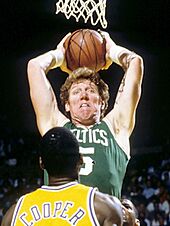
After the 1984–85 season, Walton contacted two of the best teams: the Boston Celtics and the Los Angeles Lakers. The Celtics players liked the idea of having Walton as a teammate. He would be a backup for Robert Parish and Kevin McHale. Red Auerbach made the trade happen.
On September 6, 1985, Walton was traded to the Boston Celtics. He was traded for Cedric Maxwell and a 1986 draft pick.
Walton played a career-high 80 games for Coach KC Jones and the Celtics during the 1985–86 season. Walton averaged 7.6 points and 6.8 rebounds in 19 minutes. He had a career-high 56.2 field goal percentage. He was a good backup for McHale and Parish. Playing with Larry Bird, Danny Ainge, and Dennis Johnson, Walton won the 1986 NBA Sixth Man of the Year Award. They also won the NBA championship. He became the only player to win an NBA Finals MVP, Sixth Man Award, and regular season MVP.
The 1986 NBA playoffs were Walton's first time in the postseason in almost ten years. He was 33 years old. He averaged 6.7 points and 9.3 rebounds. The Celtics swept the Chicago Bulls with Michael Jordan in the first round.
In the 1986 NBA Finals, the Celtics beat the Houston Rockets 4–2 to win the NBA Championship. Walton averaged 8.0 points and 6.7 rebounds.
Larry Bird said about Walton joining the Celtics, "It was all a matter of if he could stay healthy. We already had a pretty good team, and I think adding him really helped us."
Final Playing Year (1986–1987)
Walton was injured again in the 1986–87 season. He only played in ten games that season. He spent the 1987–88 season on the Celtics' injured list. He tried to come back in February 1990, but injuries stopped him. He then retired as a player.
Overall, Walton played 90 games for the Celtics. He averaged 7.0 points and 6.4 rebounds.
National Team Career
At age 17, in the summer of 1970, Walton was chosen to play for the U.S. national basketball team. They played in the 1970 FIBA World Championship. The team finished in a disappointing fifth place. Walton was the youngest player and played very little.
1972 Olympics
Walton was chosen for the 1972 U.S. Olympic basketball team. However, he chose not to play. Some people thought it was a political statement because he was against the Vietnam War. But the main reason was his bad experience at the 1970 World Championships. Walton said he was exposed to "negative coaching" and "foul language" there.
In the men's basketball final, the United States lost controversially to the Soviet Union 51–50. They finished in second place. Many believed that if Walton had played, the U.S. team would have won.
Legacy
Coach Jack Ramsay called Walton the best Portland Trail Blazer ever. Ramsay said, "Walton could do everything, he had great timing, complete vision of the floor, had excellent fundamentals and was a great passer." He loved playing basketball. Ramsay also said Walton's injuries were very frustrating for both of them.
Walton later apologized for how he left the Portland Trail Blazers. He said, "I regret that I wasn't a better person. A better player. I regret that I got hurt."
Walton reflected on his career, saying he loved basketball and played until his body couldn't go anymore. He had 38 orthopedic surgeries. He said he was lucky to be healthy at the end.
Overall, Walton played 468 games in his NBA career. He averaged 13.3 points, 10.5 rebounds, and 2.2 blocked shots. His injuries limited his career. He played in only 44% of the regular season games in his 13-year career. His listed height was 6 feet 11 inches, but some say he was taller.
In 2021, The Athletic ranked Walton as the 64th greatest player in NBA history.
Media Career
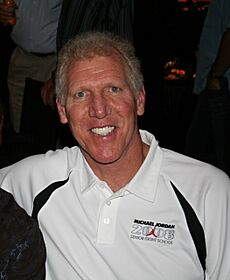
Walton overcame a stuttering problem when he was 28 years old. He got help from famous broadcaster Marty Glickman.
Walton said about his speech issues, "I'm a stutterer. I never spoke to anybody. I lived most of my life by myself. But as soon as I got on the court I was fine." He said learning to speak became his "greatest accomplishment."
After retiring as a player, Walton became a basketball commentator. He worked for CBS, NBC, ABC, and ESPN. He left ESPN in 2009 because of back problems. After back surgery, Walton returned to broadcasting part-time for the Sacramento Kings. In 2012, ESPN and the Pac-12 Network announced Walton would return to full-time broadcasting.
Walton often worked with Dave Pasch for Pac-12 games. His commentary was known for his frequent use of unique phrases. He often worked with Steve "Snapper" Jones for national NBA games.
Walton's 2003 TV series Bill Walton's Long Strange Trip aired on ESPN. Walton was the subject and star.
While broadcasting a game, Walton mentioned he had appeared in the movie Ghostbusters. His co-commentator, Dave Pasch, questioned him about it. Research later proved Walton was right.
Walton hosted his own satellite radio show, One More Saturday Night. It was named after a Grateful Dead song.
In 2001, Walton won an Emmy Award for "Best Live Sports Television Broadcast." In 2018, he won the CoSIDA Dick Enberg Award.
Personal Life
Walton lived in his hometown of San Diego with his wife Lori Matsuoka. He and his first wife, Susie, had four sons: Adam, Nathan, Luke, and Chris.
His son Luke became an NBA player. He won two NBA championships with the Lakers in 2009 and 2010. This made Bill and Luke the first NBA father-son pair to both win multiple NBA championships. Luke also became an NBA head coach.
Chris Walton played basketball for San Diego State. Nate Walton played basketball at Princeton. Adam Walton played at Louisiana State University. Walton's brother, Bruce Walton, played in the National Football League.
Walton had severe ankle problems. Both his ankles were surgically fused. In 2009, he had an eight-hour spinal-fusion surgery. He could not walk to the hospital before the surgery. After the successful surgery, he was in the hospital for a week. He could not move freely for a year.
Walton was known as a vegetarian and practiced meditation.
Walton had a close lifelong friendship with Coach John Wooden. He visited him often. Walton said, "Coach Wooden is the most influential person in my life outside of my mom and dad."
Walton was a big fan of the Grateful Dead band. He started going to their concerts in 1967. He attended more than 850 Grateful Dead concerts. He even traveled with the band to Egypt for a concert in 1978. He often quoted Grateful Dead lyrics in interviews. To fellow fans, Walton was known as "Grateful Red" and the "Big Red Deadhead." In 2001, Walton was inducted into The Grateful Dead Hall of Honor.
His memoir, Back from the Dead: Searching for the Sound, Shining the Light and Throwing It Down, was released in 2016. It was on The New York Times bestseller list.
Bill Walton died from cancer at his home in San Diego on May 27, 2024, at age 71.
Awards
NBA
- 2× NBA champion (1977, 1986)
- NBA Finals MVP (1977)
- NBA Most Valuable Player (1978)
- 2× NBA All-Star (1977, 1978)
- All-NBA First Team (1978)
- All-NBA Second Team (1977)
- 2× NBA All-Defensive First Team (1977, 1978)
- NBA Sixth Man of the Year (1986)
- 50 Greatest Players in NBA History
- NBA 75th Anniversary Team
College
- 2× NCAA champion (1972–1973)
- 2× NCAA Final Four Most Outstanding Player (1972, 1973)
- 3× Naismith College Player of the Year (1972–1974)
- 3× USBWA Player of the Year (1972–1974)
- 3× Adolph Rupp Trophy (1972–1974)
- 3× Helms Foundation College Player of the Year (1972, 1973, 1974)
- 3× Sporting News College Player of the Year (1972–1974)
- 2× AP College Player of the Year (1972, 1973)
- 3× Consensus first-team All-American (1972–1974)
- 3× First-team All-Pac-8 (1972–1974)
Broadcasting
- Southern California Sports Broadcasters Association's award for "Best Television Analyst/Commentator" (1992, 1993, 1995, 1996, 1998, 1999 and 2000)
- Emmy Award for "Best Live Sports Television Broadcast" (2001)
- CoSIDA Dick Enberg Award (2018)
Honors
- No. 32 retired by Portland Trail Blazers.
- No. 32 retired by UCLA in 1990.
- Walton was the 1973 recipient of the James E. Sullivan Award.
- Walton was inducted into the UCLA Athletics Hall of Fame in 1984.
- In 1990, Walton was inducted into the Breitbard Hall of Fame by the San Diego Hall of Champions.
- In 1991, Walton received the NBPA Oscar Robertson Leadership Award.
- Walton was inducted into the Naismith Basketball Hall of Fame in 1993.
- In 1993, Walton was inducted into the Oregon Sports Hall of Fame.
- In 1994, Walton was voted into the Verizon Academic All-American Hall of Fame.
- Walton was inducted into the National High School Sports Hall of Fame in 1997.
- Walton was the first person inducted into the Grateful Dead Hall of Honor in 2001.
- Walton received the NBA Retired Players Association Humanitarian Award in 2002.
- In 2006, Walton was inducted into the National Collegiate Basketball Hall of Fame.
- In 2009, he was named one of the "top 50 sportscasters of all time."
- In 2010, Walton was inducted into the California Sports Hall of Fame.
- A bronze statue of Walton was unveiled in San Diego in 2016.
- Walton was inducted into the Boys & Girls Clubs of America Alumni Hall of Fame in 2017.
- The gymnasium at the Boys and Girls Club in Santee, California, was named the Bill Walton Gymnasium in 2018.
- Walton received the 2024 Naismith Outstanding Contributors to Men's Basketball Award.
Career Statistics
| Legend | |||||
|---|---|---|---|---|---|
| GP | Games played | GS | Games started | MPG | Minutes per game |
| FG% | Field goal percentage | 3P% | 3-point field goal percentage | FT% | Free throw percentage |
| RPG | Rebounds per game | APG | Assists per game | SPG | Steals per game |
| BPG | Blocks per game | PPG | Points per game | Bold | Career high |
NBA
Regular season
| Year | Team | GP | GS | MPG | FG% | 3P% | FT% | RPG | APG | SPG | BPG | PPG |
|---|---|---|---|---|---|---|---|---|---|---|---|---|
| 1974–75 | Portland | 35 | — | 32.9 | .513 | — | .686 | 12.6 | 4.8 | .8 | 2.7 | 12.8 |
| 1975–76 | Portland | 51 | — | 33.1 | .471 | — | .583 | 13.4 | 4.3 | 1.0 | 1.6 | 16.1 |
| 1976–77† | Portland | 65 | — | 34.8 | .528 | — | .697 | 14.4* | 3.8 | 1.0 | 3.2* | 18.6 |
| 1977–78 | Portland | 58 | — | 33.3 | .522 | — | .720 | 13.2 | 5.0 | 1.0 | 2.5 | 18.9 |
| 1979–80 | San Diego | 14 | — | 24.1 | .503 | — | .593 | 9.0 | 2.4 | .6 | 2.7 | 13.9 |
| 1982–83 | San Diego | 33 | 32 | 33.3 | .528 | — | .556 | 9.8 | 3.6 | 1.0 | 3.6 | 14.1 |
| 1983–84 | San Diego | 55 | 46 | 26.8 | .556 | .000 | .597 | 8.7 | 3.3 | .8 | 1.6 | 12.1 |
| 1984–85 | L.A. Clippers | 67 | 37 | 24.6 | .521 | .000 | .680 | 9.0 | 2.3 | .7 | 2.1 | 10.1 |
| 1985–86† | Boston | 80 | 2 | 19.3 | .562 | — | .713 | 6.8 | 2.1 | .5 | 1.3 | 7.6 |
| 1986–87 | Boston | 10 | 0 | 11.2 | .385 | — | .533 | 3.1 | .9 | .1 | 1.0 | 2.8 |
| Career | 468 | 117 | 28.3 | .521 | .000 | .660 | 10.5 | 3.4 | .8 | 2.2 | 13.3 | |
| All-Star | 1 | 1 | 31.0 | .429 | — | 1.000 | 10.0 | 2.0 | 3.0 | 2.0 | 15.0 | |
Playoffs
| Year | Team | GP | GS | MPG | FG% | 3P% | FT% | RPG | APG | SPG | BPG | PPG |
|---|---|---|---|---|---|---|---|---|---|---|---|---|
| 1977† | Portland | 19 | — | 39.7 | .507 | — | .684 | 15.2 | 5.5 | 1.1 | 3.4 | 18.2 |
| 1978 | Portland | 2 | — | 24.5 | .611 | — | .714 | 11.0 | 2.0 | 1.5 | 1.5 | 13.5 |
| 1986† | Boston | 16 | 0 | 18.2 | .581 | .000 | .826 | 6.4 | 1.7 | .4 | .8 | 7.9 |
| 1987 | Boston | 12 | 0 | 8.5 | .480 | — | .357 | 2.6 | .8 | .3 | .3 | 2.4 |
| Career | 49 | 0 | 24.4 | .525 | .000 | .673 | 9.1 | 3.0 | .7 | 1.7 | 10.8 | |
College
| Year | Team | GP | GS | MPG | FG% | 3P% | FT% | RPG | APG | SPG | BPG | PPG |
|---|---|---|---|---|---|---|---|---|---|---|---|---|
| 1971–72 | UCLA | 30 | — | — | .640 | — | .704 | 15.5 | — | — | — | 21.1 |
| 1972–73 | UCLA | 30 | — | — | .650 | — | .569 | 16.9 | — | — | — | 20.4 |
| 1973–74 | UCLA | 27 | — | — | .665 | — | .580 | 14.7 | 5.5 | — | — | 19.3 |
| Career | 87 | — | — | .651 | — | .642 | 15.7 | 5.5 | — | — | 20.3 | |
Film and Television Appearances
| Year | Title | Role | Notes |
|---|---|---|---|
| 1984 | Ghostbusters | Uncredited cameo | |
| 1995 | Forget Paris | Bill Walton (self) | |
| 1996 | Celtic Pride | Bill Walton (self) | |
| 1997 | The 6th Man | Bill Walton (self) | |
| 1998 | He Got Game | Bill Walton (self) | Cameo |
| 2000 | Little Nicky | Bill Walton (self) | |
| 2009 | Who Shot Mamba? | Kelli Sherman | Digital release |
| 2018 | Uncle Drew | Bill Walton (self) | |
| 2018 | Fire on the Mountain | Narrator | Short film |
| 2023 | The Luckiest Guy in the World | Subject | ESPN 30 for 30 - Volume IV: 123 |
Television
| Year | Title | Role | Notes |
|---|---|---|---|
| 1979 | The American Sportsman | Bill Walton (self) | "Bill meets Viola" aired April 21, 1979, shot in the Philippines |
| 1993 | Wheel of Fortune | Contestant | Season 10, Episode 165: "Final Friday" (aired May 7, 1993); winner of $63,924 for charity. |
| 1997 | The Jeff Foxworthy Show | Lester Ligget | Season 2, Episode 23: "Field of Schemes" |
| 1997 | The Sentinel | Bill Walton (self) | Season 3, Episode 2: "Three Point Shot" |
| 1997 | Pacific Blue | Bill Walton (self) | Season 3, Episode 6: "Sandman" |
| 1999 | Snoops | Cop | Season 1, Episode 4: "Higher Calling" |
| 2001 | Inside Schwartz | Bill Walton (self) | Season 1, Episode 1: "Pilot" |
| 2002 | One on One | Bill Walton (self) | Season 1, Episode 22: "He Got Game... Again" |
| 2003 | Wheel of Fortune | Contestant | Season 21, Episode 51: "NBA Week 1" (aired Nov. 27, 2003); won money for charity. |
| 2004 | Less than Perfect | Bill Walton (self) | Season 2, Episode 15: "Live Stinks (Sometimes)" |
| 2005 | Wheel of Fortune | Contestant | Season 23, Episode 36: "NBA Week 1" (aired Oct. 31, 2005); won money for charity. |
| 2021 | American Dad! | Bill Walton (voice) | Season 16, Episode 4: "Shakedown Steve" |
Images for kids
See also
 In Spanish: Bill Walton para niños
In Spanish: Bill Walton para niños
 | Selma Burke |
 | Pauline Powell Burns |
 | Frederick J. Brown |
 | Robert Blackburn |


